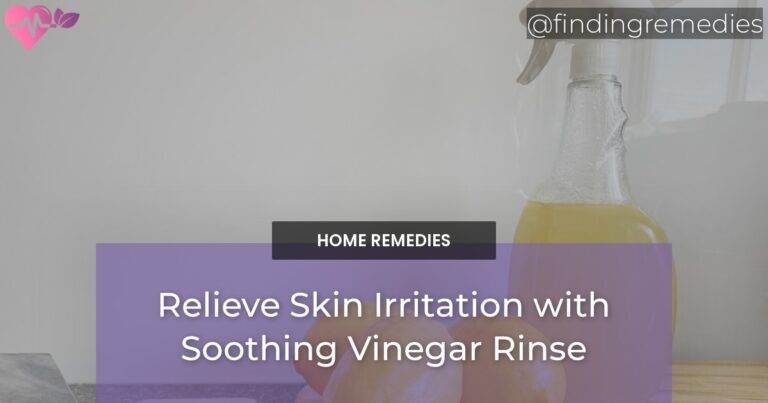If you suffer from skin irritation and are looking for a natural remedy, then a soothing vinegar rinse may be just what you need. Vinegar has long been used for its numerous health benefits, and its ability to relieve itchiness and inflammation is no exception. In this comprehensive article, we will explore the different types of vinegar that can be used for a rinse, as well as the various skin conditions that can be relieved by this simple home remedy. We will also delve into the process of making a vinegar rinse, including the ingredients required and the step-by-step procedure. Additionally, we will discuss how vinegar works to reduce inflammation and itching, and the dosage and application process for optimal results. Finally, we will provide some additional tips and precautions to ensure a safe and effective experience with vinegar rinses. So, let’s dive in and discover the wonders of soothing vinegar rinses for the skin.
Table of Contents
Types of Vinegar to Use
Apple Cider Vinegar
Apple cider vinegar is a popular choice for a vinegar rinse due to its numerous health benefits. It is known for its antibacterial and antifungal properties, making it effective in treating various skin conditions. Its acidity helps restore the skin’s natural pH level, providing relief from itching and irritation.
White Vinegar
White vinegar, also known as distilled vinegar, is another excellent option for a vinegar rinse. It is highly versatile and readily available. White vinegar helps soothe itchy skin and can be used to relieve conditions such as sunburns and insect bites.
Balsamic Vinegar
Balsamic vinegar, often used in culinary applications, can also be used as a skin rinse. It contains antioxidants that help reduce inflammation and promote healthy skin. However, due to its dark color, it may not be suitable for individuals with fair or sensitive skin.
Red Wine Vinegar
Red wine vinegar, made from the fermentation of red wine, offers similar benefits to other types of vinegar. It is particularly useful for relieving itching caused by conditions such as poison ivy. Its astringent properties help soothe the skin and reduce inflammation.
Rice Vinegar
Rice vinegar, commonly used in Asian cuisine, can also be used for a soothing vinegar rinse. It is gentle on the skin and helps alleviate irritation and itchiness. Rice vinegar is suitable for individuals with sensitive skin.
Skin Conditions Relieved by Vinegar Rinse
Poison Ivy
Vinegar rinse is an effective home remedy for relieving itchiness caused by poison ivy. Its anti-inflammatory properties help reduce redness and swelling. Gently applying the vinegar rinse to the affected area can provide immediate relief.
Sunburns
When applied topically, vinegar can help alleviate the discomfort associated with sunburns. Its cooling effect provides relief from the burning sensation, and its acetic acid content aids in reducing inflammation and promoting healing.
Insect Bites and Stings
Vinegar rinse can also provide relief from the itching and swelling caused by insect bites and stings. Its antiseptic properties help prevent infection, while its pH-balancing effect helps soothe the skin.
Making a Vinegar Rinse
Ingredients
To make a vinegar rinse, you will need:
- 1 part vinegar (apple cider vinegar, white vinegar, balsamic vinegar, red wine vinegar, or rice vinegar)
- 2 parts water
- A clean container or spray bottle
Procedure
- Mix the vinegar and water in the container or spray bottle.
- Shake well to ensure thorough mixing.
- Your vinegar rinse is now ready for use.
Reducing Inflammation and Itching
How Vinegar Works
Vinegar works by balancing the skin’s pH level, which helps reduce inflammation and itching. It also possesses antimicrobial properties, which can help prevent infection and promote healing.
Benefits of Vinegar Rinse
The benefits of using a vinegar rinse on the skin include:
- Relief from itchiness and inflammation
- Antibacterial and antifungal properties
- Promotion of healthy skin
- Prevention of infection
- Availability and affordability
Dosage and Procedure
Dilution Ratio
A recommended dilution ratio for vinegar rinse is 1 part vinegar to 2 parts water. However, individuals with sensitive skin may prefer a higher water content to avoid any potential irritation.
Application Process
To apply the vinegar rinse:
- Dampen a clean cloth or cotton pad with the vinegar rinse.
- Gently dab or wipe the affected area with the cloth or pad.
- Allow it to air dry or rinse off after a few minutes.
Additional Tips and Precautions
Patch Test
Before applying the vinegar rinse to a large area, perform a patch test on a small, inconspicuous area of skin. This will help determine if you have any adverse reactions or allergies to the vinegar.
Avoiding Eye Contact
Avoid getting the vinegar rinse into your eyes, as it can cause irritation. If accidental eye contact occurs, rinse thoroughly with water.
Seek Medical Attention
If your skin condition worsens or persists despite using the vinegar rinse, it is advisable to seek medical attention. A healthcare professional can provide a proper diagnosis and recommend appropriate treatment.
Regular Use Precautions
While vinegar rinses can be beneficial for relieving skin irritation, it is important to use them in moderation. Excessive or prolonged use may disrupt the skin’s natural pH balance and cause dryness or irritation. If in doubt, consult a dermatologist.
Conclusion
A soothing vinegar rinse can be a simple and effective home remedy for relieving skin irritation, itchiness, and inflammation. With its various types and numerous benefits, vinegar offers a natural alternative to commercial products. By following the proper dilution ratio and application process, and taking necessary precautions, you can experience the wonders of vinegar rinses in promoting healthy skin. Remember to consult a healthcare professional if you have any concerns or if your skin condition persists. Embrace the power of nature and give your skin the relief it deserves with a soothing vinegar rinse.

